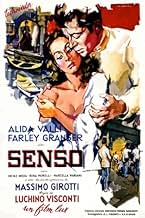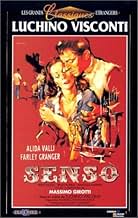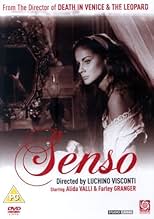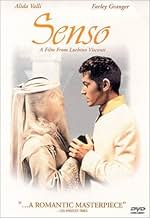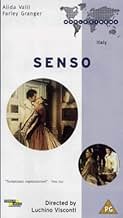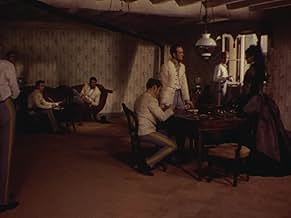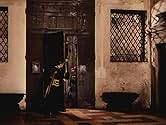Senso
- 1954
- Tous publics
- 2h 3m
IMDb RATING
7.4/10
9.3K
YOUR RATING
An Italian Countess is allied with Nationalists during the Italian-Austrian war of unification. However, she risks betraying their cause when she falls in love with an Austrian lieutenant.An Italian Countess is allied with Nationalists during the Italian-Austrian war of unification. However, she risks betraying their cause when she falls in love with an Austrian lieutenant.An Italian Countess is allied with Nationalists during the Italian-Austrian war of unification. However, she risks betraying their cause when she falls in love with an Austrian lieutenant.
- Awards
- 3 wins & 2 nominations total
Franco Arcalli
- Un soldato
- (uncredited)
Aldo Bajocchi
- Un soldato
- (uncredited)
Ottone Candiani
- Un soldato
- (uncredited)
Nando Cicero
- Un soldato
- (uncredited)
Claudio Coppetti
- Un soldato
- (uncredited)
Cristoforo De Hartungen
- Il generale Hauptmann
- (uncredited)
Tony Di Mitri
- Un soldato
- (uncredited)
Featured reviews
In 1866, in the spring of Venice, an underground rebel movement against the Austrian occupation in Italy is getting stronger. The married Countess Livia Serpieri (Alida Valli) sees her cousin challenging the Austrian Lieutenant Franz Mahler (Farley Granger) for a duel in the opera and being arrested and sent to the exile for one year. When she meets Mahler, she first hates him but after a night together walking along the streets in Venice, she falls deeply in love for him, becoming his mistress. When the war starts, she moves to her property in the country missing Mahler. When he visits her during a night, she forgets her principles, decency and betrayals her cause with cruel and tragic consequences.
I am one of the greatest worldwide fans of IMDb, but sometimes I am disappointed with the ranking of this site. How can a masterpiece like "Senso" be out of any worldwide serious list of the top 250 best movies? The "red noble" Luchino Visconti is one of the best directors ever and this masterpiece explores a wonderful, cruel and tragic romance in times of the Italian "El Risorgimento". Each scene in this movie looks like a picture of the XIX Century, full of details. The cinematography is one of the most beautiful I have ever seen, with a stunning recreation of a period. The story is fantastic, with a gorgeous Alida Valli in the top of her beauty, and Farley Granger splendid as a scum lover. The restored DVD released in Brasil by Versatil distributor is amazing, full of excellent extras. My vote is ten.
Title (Brazil): "Senso Sedução da Carne" ("Senso Seduction of the Flesh")
I am one of the greatest worldwide fans of IMDb, but sometimes I am disappointed with the ranking of this site. How can a masterpiece like "Senso" be out of any worldwide serious list of the top 250 best movies? The "red noble" Luchino Visconti is one of the best directors ever and this masterpiece explores a wonderful, cruel and tragic romance in times of the Italian "El Risorgimento". Each scene in this movie looks like a picture of the XIX Century, full of details. The cinematography is one of the most beautiful I have ever seen, with a stunning recreation of a period. The story is fantastic, with a gorgeous Alida Valli in the top of her beauty, and Farley Granger splendid as a scum lover. The restored DVD released in Brasil by Versatil distributor is amazing, full of excellent extras. My vote is ten.
Title (Brazil): "Senso Sedução da Carne" ("Senso Seduction of the Flesh")
Opens with a lush rendition of Il Trovatore at Teatro La Fenice, SENSO is an ostentatious melodrama imprinted with Visconti's pronounced blue blood opulence, retells an Italian countess' (Valli) vain and poignant attempt to pursue her one-sided affection to an Austrian officer (Granger shines in the rich Technicolor palette as an Adonis), whose misogyny and promiscuity will cause his own doom and mar her mentality up to the hilt.
The film sets its time during the fall of Austrian occupation in Venezia 1866, Valli is wavering between her bureaucratic husband (Moog) and rioting cousin (Girotti), to break loose from the stalemate, she irrevocably falls for a young lieutenant in the opponent camp, but he is no knight in shining armor but a foul and spineless scoundrel with irresistible sheen of deadly charm. Granger's gorgeous lover-boy image is a quintessential smokescreen to veil his despicable innards, but after all, it is a consensual deal despite of Valli's false hope, more significantly its anti-war signals have been forcibly cast by Granger's self-abandonment and the lousy war battlefield experienced by Girotti, which, more plausibly it is an intentional move by Visconti, a distraction from the central turmoil, but done with a tinge of amateurish fecklessness.
Valle shoulders on a profound effort to scrutinize a woman's inscrutable sexual desire which being repressed for too long, both she and Granger align themselves with Visconti's brimful-of- emotion style (again, thanks to Techincolor and the overstuffed score as well) which approximate the OTT threshold in certain degree, although falling out with Visconti eventually, Granger succeeds in bringing about his best screen persona and it was such a great era when a gay man can play an outright straight womanizer on the celluloid.
On the one hand SENSO fails to impress me as my favorite among Visconti's work of art, and scale-wise pales by comparison with LUDWIG (1972, 8/10) and THE LEOPARD (1963, 8/10), but on the other hand, only Visconti can flaunt such an overbearing melodrama with true mettle and without any compromise, a trend-setter would inspire later kindred spirits, for instance Baz Luhrmann's 3D adaption of the bourgeois sumptuosity THE GREAT GATSBY (2013, 8/10).
The film sets its time during the fall of Austrian occupation in Venezia 1866, Valli is wavering between her bureaucratic husband (Moog) and rioting cousin (Girotti), to break loose from the stalemate, she irrevocably falls for a young lieutenant in the opponent camp, but he is no knight in shining armor but a foul and spineless scoundrel with irresistible sheen of deadly charm. Granger's gorgeous lover-boy image is a quintessential smokescreen to veil his despicable innards, but after all, it is a consensual deal despite of Valli's false hope, more significantly its anti-war signals have been forcibly cast by Granger's self-abandonment and the lousy war battlefield experienced by Girotti, which, more plausibly it is an intentional move by Visconti, a distraction from the central turmoil, but done with a tinge of amateurish fecklessness.
Valle shoulders on a profound effort to scrutinize a woman's inscrutable sexual desire which being repressed for too long, both she and Granger align themselves with Visconti's brimful-of- emotion style (again, thanks to Techincolor and the overstuffed score as well) which approximate the OTT threshold in certain degree, although falling out with Visconti eventually, Granger succeeds in bringing about his best screen persona and it was such a great era when a gay man can play an outright straight womanizer on the celluloid.
On the one hand SENSO fails to impress me as my favorite among Visconti's work of art, and scale-wise pales by comparison with LUDWIG (1972, 8/10) and THE LEOPARD (1963, 8/10), but on the other hand, only Visconti can flaunt such an overbearing melodrama with true mettle and without any compromise, a trend-setter would inspire later kindred spirits, for instance Baz Luhrmann's 3D adaption of the bourgeois sumptuosity THE GREAT GATSBY (2013, 8/10).
It's no coincidence that the film opens at the opera. In some fine deep shots we are introduced to our characters with the performance in the background - no doubt to establish the stylistic connection. So Visconti, and collaborator Franco Zefferelli, wanted to make an opera without the singing. This gives us grandeur, but rigidity, and even the mini riot that takes place in the opera house at the outset is aesthetically stylised. You need to buy into the approach at this point, and I simply didn't. It just seemed like a bad idea. Opera is a stage spectacle, all about grand gesture, posturing, formality; it cannot transmit subtleties, the format doesn't allow it. Take away the music and you are left with a banal story and a lot of fancy costumery. For Visconti, constantly wanting to remind us of his noble descent, that is enough - his main concern is showing us lavish interior decor, an obsession you'll find either stirring or stifling. For music we get Bruckner, whose indecisive, meandering drone is largely ignorable.
Cinematically, the result is half-baked. Valli walks into a room full of Austrian soldiers. David Lean (who I equate with Visconti to some extent) would have made a significant scene out of this but Visconti just gives us soldiers draped around the place in various unnatural postures, as you might expect. One of them moves and strikes up a different posture as you might expect. It's all cut and pasted from the Manual of Things Seen and Done Before. The camera stays back, wide angle, and doesn't lend much of a hand with the narrative, leaving the players to communicate with exaggerated gesture.
A married Venetian countess falls for a young Austrian army officer - we know from the first scene that he is an utter cad, but she doesn't or rather she does, but being a one dimensional clinging woman she is bound to hurl herself into disastrous folly. Hence the film mainly consists of Valli ringing the emotional changes over her illicit affair. Visconti indulged so much time in this that he must have thought he was dealing with an original topic. Along the way, there's the approaching end of Austrian rule of northern Italy and some slight comment on the collaboration of senior Venetian figures but that point seems hardly worth making after all this time. There is a lengthy section where Valli's cousin (dashing hero figure) rushes on a military errand rather ridiculously right across the battle line of two approaching armies, but this section was apparently heavily edited, rendering it pointless and incomprehensible. The battle scenes are childish a puff of smoke and the nearest two soldiers fall to the ground this happens repeatedly.
The script can't do anything with the stereotypical characters and the one-sentence plot and there are no stand-out lines. This is extraordinary considering the 'English dialogue by Tennessee Williams and Paul Bowles'. Probably it was there but smothered by Visconti's operatic technique. One wonders why these writers were attracted to the project (apart from a free holiday in Rome) perhaps they liked the final humiliation of the countess, which is quite harsh even gleefully misogynistic. She gets her own back though, and it seems the moral is that both men and woman, with their impulsive need for each other, no matter how noble the exterior, are stupid, weak and mutually self-destructive. That ridicules everybody (...or does it?).
Funnily enough, the main problem is Alida Valli, who is required to over-emote in every scene (in total contrast to her depressive role in "The Third Man") it's a little unpleasant to watch and she soon begins to annoy. She doesn't look right at all during the romance too hard-edged. Farley Granger was actually the main point of interest. His slight woodenness suits the impossibly white uniform and cape he was made to wear (what sort of wash-powder did they have in those days?), and in the climactic drunken scene (enhanced by a delightful whore - the highlight of the film) he did as well as anyone could have done under a direction that demanded over-amplification of every attempted nuance. And his eyes expressed something beyond the paltry plot of the film as if betraying that this Italian job was an odd, intense experience for him for one reason or another. So, for all the film's grandeur, all I was left with was some vague speculation of a personal nature about one of its players. Perhaps his story relating to the real world - is the film Visconti should have made.
Cinematically, the result is half-baked. Valli walks into a room full of Austrian soldiers. David Lean (who I equate with Visconti to some extent) would have made a significant scene out of this but Visconti just gives us soldiers draped around the place in various unnatural postures, as you might expect. One of them moves and strikes up a different posture as you might expect. It's all cut and pasted from the Manual of Things Seen and Done Before. The camera stays back, wide angle, and doesn't lend much of a hand with the narrative, leaving the players to communicate with exaggerated gesture.
A married Venetian countess falls for a young Austrian army officer - we know from the first scene that he is an utter cad, but she doesn't or rather she does, but being a one dimensional clinging woman she is bound to hurl herself into disastrous folly. Hence the film mainly consists of Valli ringing the emotional changes over her illicit affair. Visconti indulged so much time in this that he must have thought he was dealing with an original topic. Along the way, there's the approaching end of Austrian rule of northern Italy and some slight comment on the collaboration of senior Venetian figures but that point seems hardly worth making after all this time. There is a lengthy section where Valli's cousin (dashing hero figure) rushes on a military errand rather ridiculously right across the battle line of two approaching armies, but this section was apparently heavily edited, rendering it pointless and incomprehensible. The battle scenes are childish a puff of smoke and the nearest two soldiers fall to the ground this happens repeatedly.
The script can't do anything with the stereotypical characters and the one-sentence plot and there are no stand-out lines. This is extraordinary considering the 'English dialogue by Tennessee Williams and Paul Bowles'. Probably it was there but smothered by Visconti's operatic technique. One wonders why these writers were attracted to the project (apart from a free holiday in Rome) perhaps they liked the final humiliation of the countess, which is quite harsh even gleefully misogynistic. She gets her own back though, and it seems the moral is that both men and woman, with their impulsive need for each other, no matter how noble the exterior, are stupid, weak and mutually self-destructive. That ridicules everybody (...or does it?).
Funnily enough, the main problem is Alida Valli, who is required to over-emote in every scene (in total contrast to her depressive role in "The Third Man") it's a little unpleasant to watch and she soon begins to annoy. She doesn't look right at all during the romance too hard-edged. Farley Granger was actually the main point of interest. His slight woodenness suits the impossibly white uniform and cape he was made to wear (what sort of wash-powder did they have in those days?), and in the climactic drunken scene (enhanced by a delightful whore - the highlight of the film) he did as well as anyone could have done under a direction that demanded over-amplification of every attempted nuance. And his eyes expressed something beyond the paltry plot of the film as if betraying that this Italian job was an odd, intense experience for him for one reason or another. So, for all the film's grandeur, all I was left with was some vague speculation of a personal nature about one of its players. Perhaps his story relating to the real world - is the film Visconti should have made.
Italy is still probably in ruins of war at this point, real or figurative, so what does this filmmaker do, Visconti? By waving his wand, he conjures up an earlier Italy, also in the throes of occupation and war, it's the last days of the Austrian occupation around Venice, but now it can all be placed in the safer distance of history, set up as operatic melodrama on a stage.
You'll see this self-referential waving of the hand in the just the opening scene. We open in an opera house in the middle of a play, with actors on stage valiantly rushing to weapons. As soon as the play is over, patriot viewers rain the place down with revolutionary pamphlets.
It is an operatic play that we see; film as opera. Up on this stage, collaboration with a regime can be safely contained in a love affair, rich countess falling for the dashing Austrian lieutenant. In the usual melodramatic passion, she risks all. The whole point of the story is to have moments like when news reach her of a battle won against the Austrians, but instead of rejoicing at liberation, she must look terrified because her beau might have been on that battlefield.
It's not something I can get excited about, nor would I recommend you go out of your way to find it, except as contrast to other, more pertinent things about how a viewer can be choreographed through space. I mean, here is a cinema of vistas and gestures. When a camera pans around a room that someone walks in, it's just this room that we see. War is suddenly introduced as a series of vistas with crowds rushing about, filmed in a disjointed way in order to convey chaos and mobilization and yet they manage to look placid and painterly.
But how about this? It ends with another self-referential note but now one that waves away illusion, dispels fiction. Having risked all, she finds out he's not the dashing hero of operas that she wanted him to be.
Up on this stage, turning your back on your countrymen is only the innocent fallout of passion, all because you maybe yearned for some of the romance of stories from the past.
You'll see this self-referential waving of the hand in the just the opening scene. We open in an opera house in the middle of a play, with actors on stage valiantly rushing to weapons. As soon as the play is over, patriot viewers rain the place down with revolutionary pamphlets.
It is an operatic play that we see; film as opera. Up on this stage, collaboration with a regime can be safely contained in a love affair, rich countess falling for the dashing Austrian lieutenant. In the usual melodramatic passion, she risks all. The whole point of the story is to have moments like when news reach her of a battle won against the Austrians, but instead of rejoicing at liberation, she must look terrified because her beau might have been on that battlefield.
It's not something I can get excited about, nor would I recommend you go out of your way to find it, except as contrast to other, more pertinent things about how a viewer can be choreographed through space. I mean, here is a cinema of vistas and gestures. When a camera pans around a room that someone walks in, it's just this room that we see. War is suddenly introduced as a series of vistas with crowds rushing about, filmed in a disjointed way in order to convey chaos and mobilization and yet they manage to look placid and painterly.
But how about this? It ends with another self-referential note but now one that waves away illusion, dispels fiction. Having risked all, she finds out he's not the dashing hero of operas that she wanted him to be.
Up on this stage, turning your back on your countrymen is only the innocent fallout of passion, all because you maybe yearned for some of the romance of stories from the past.
A feast for the eyes this lush melodrama may be an acquired taste for some but I doubt anyone could say it wasn't visually stunning. Venice is rendered so beautifully you will want to hop the next flight there and with the composition of all the other scenes it is like watching a story take place inside of paintings. However as gorgeous as all that is it also can be distracting and take you out of the story as you study the detail which at times feels a bit surreal. Having only seen Alida Valli in her English language films where she often seemed stiff and ill at ease her performance here is quite a revelation. She is fully in command of the screen and her anguished turmoil is compelling to watch. Farley is not bad although his part really doesn't offer him much more than being a slick and very handsome wastrel.
Did you know
- TriviaThe film opens in La Fenice, the Venice opera house. La Fenice was destroyed by arson in 1996, but reopened in 2003. Enlarged frames of this movie were used as a reference in reconstructing it.
- Quotes
Il tenente Franz Mahler: It's too late! It's over! I'm not your romantic hero!
- Alternate versionsTwo versions of the film are available on video.
- One version is missing the scene where Livia tries to explain where all the money meant for the troops went.
- Another version is missing the climatic battle sequence between the Austrian and Italian troops.
- ConnectionsEdited into Histoire(s) du cinéma: La monnaie de l'absolu (1999)
- SoundtracksSinfonia N. 7 in mi maggiore (7th Symphony)
Music by Anton Bruckner
Performed by Orchestra Sinfonica Nazionale della Rai
Conducted by Franco Ferrara
- How long is Senso?Powered by Alexa
Details
- Release date
- Country of origin
- Languages
- Also known as
- The Wanton Contessa
- Filming locations
- Teatro La Fenice, Venice, Veneto, Italy(opening scenes)
- Production company
- See more company credits at IMDbPro
Box office
- Budget
- ITL 700,000,000 (estimated)
- Gross US & Canada
- $27,723
- Opening weekend US & Canada
- $3,984
- Oct 28, 2018
- Gross worldwide
- $27,723
- Runtime2 hours 3 minutes
- Color
Contribute to this page
Suggest an edit or add missing content


![Watch Trailer originale italiano [OV]](https://m.media-amazon.com/images/M/MV5BYzc0Y2MyOGMtMzg0My00Mzc4LWIwYjItZjg1ZDhmMDZmOTlkXkEyXkFqcGdeQXRodW1ibmFpbC1pbml0aWFsaXplcg@@._V1_QL75_UX500_CR0)

